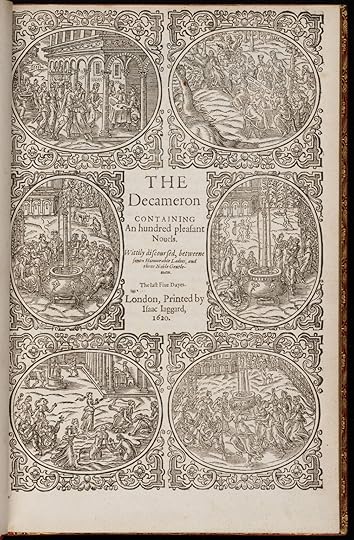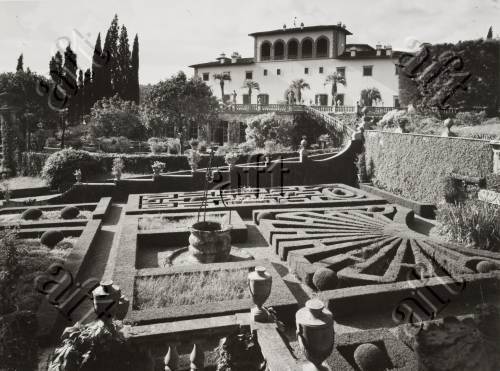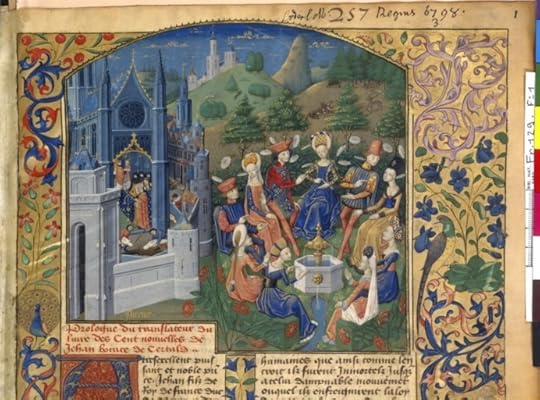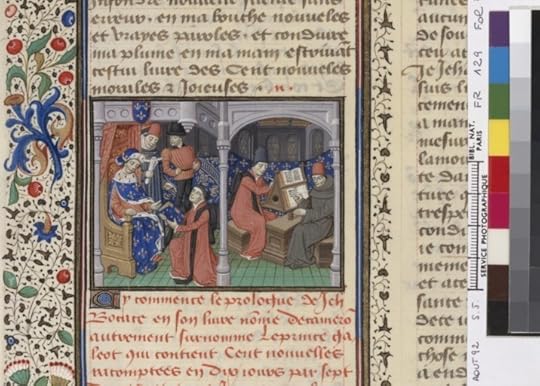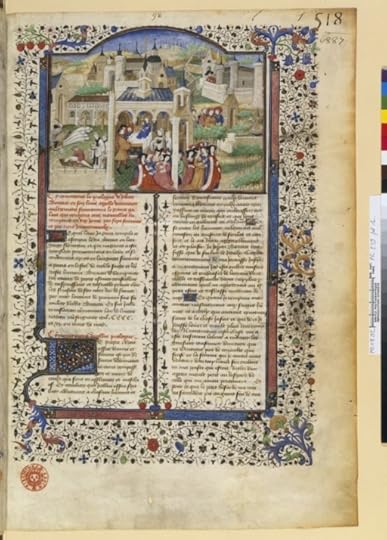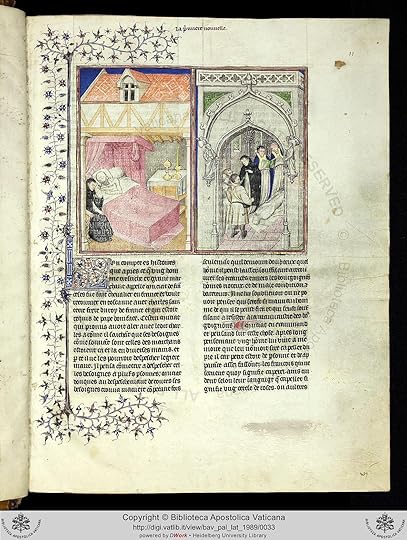Divine Comedy + Decameron discussion

This topic is about
The Decameron
Boccaccio's Decameron
>
6/2-6/8 : The Decameron, First Day, Introduction & Stories 1-5
message 1:
by
Kris
(new)
-
added it
Apr 14, 2014 09:47AM
 Mod
Mod
reply
|
flag
 I really liked the first story :) and I looked into if there really is a "Saint Ciappaletto" but I couldn't find anything. Does anyone know anything about that?
I really liked the first story :) and I looked into if there really is a "Saint Ciappaletto" but I couldn't find anything. Does anyone know anything about that?
 You two early birds are making me itch to start! :) But I need to finish a book before that... *itching*
You two early birds are making me itch to start! :) But I need to finish a book before that... *itching*Dlee wrote: "This is the first time the immorality and its reasons have been broached. At least none of the modern stories based on Plague times ..."
That's a great point. I'm very curious to see how Boccaccio presents the frame of his stories. The 1347-1351 "Black Death" pandemics was devastating in Europe so using it as backdrop to a courtly (?) game is not innocent...

http://en.wikipedia.org/wiki/Black_Death
I will not be able to start this until later in the week, for various reasons, but will try to catch up and stay on pace.
That map is very helpful, BP.
That map is very helpful, BP.
 Kalliope wrote: "I will not be able to start this until later in the week, for various reasons, but will try to catch up and stay on pace.
Kalliope wrote: "I will not be able to start this until later in the week, for various reasons, but will try to catch up and stay on pace.That map is very helpful, BP."
Hurry up to catch up!! Lol, says she who hasn't started yet. ;)
On the map Florence is marked as "center of uprisings" so the plague was probably particularly severe there... I'll have to look into it...
The Plague was actually devastating throughout the "connected" world:
From 1347 to 1351, the Black Death, a massive and deadly pandemic originating in China, spread along the Silk Road and swept through Asia, Europe and Africa. It may have reduced the world's population from 450 million to between 350 and 375 million. China lost around half of its population, from around 123 million to around 65 million; Europe around 1/3 of its population, from about 75 million to about 50 million; and Africa approximately 1/8 of its population, from around 80 million to 70 million (mortality rates tended to be correlated with population density so Africa, being less dense overall, had the lowest death rate).
http://en.wikipedia.org/wiki/Plague_%...
Book Portrait wrote: "
That map is very helpful, BP."
Hurry up to catch up!! Lo..."
I imagine (not read yet) that the classic by Tuchman should be relevant for this read A Distant Mirror: The Calamitous 14th Century
That map is very helpful, BP."
Hurry up to catch up!! Lo..."
I imagine (not read yet) that the classic by Tuchman should be relevant for this read A Distant Mirror: The Calamitous 14th Century
 Kalliope wrote: "I imagine (not read yet) that the classic by Tuchman should be relevant for this read A Distant Mirror: The Calamitous 14th Century "
Kalliope wrote: "I imagine (not read yet) that the classic by Tuchman should be relevant for this read A Distant Mirror: The Calamitous 14th Century "I'd say that The Merchant of Prato would be more relevant. Tuchman's book takes a French nobleman as its focal point which is quite removed from the world of Boccaccio's stories as far as I remember - townspeople, peasants, lower nobility mostly in Italy. The Prato book covers the period of the black death looking at daily life in the household of a North Italian merchant which is much closer to Boccaccio's background and personal milieu.
PS I'll be starting on the Decameron later this week
Jan-Maat wrote: "Kalliope wrote: "I imagine (not read yet) that the classic by Tuchman should be relevant for this read A Distant Mirror: The Calamitous 14th Century "
I'd say that [book:The Merchant of Prato|8357..."
Thank you, Jan-Maat.
I will wait then with Tuchman, although I have it already. I will look into the other one. It looks perfect.
I'd say that [book:The Merchant of Prato|8357..."
Thank you, Jan-Maat.
I will wait then with Tuchman, although I have it already. I will look into the other one. It looks perfect.
 Hey guys!
Hey guys!I already read this week's section, haha. I was too curious about it plus the rest of the week will be kind of hectic for me.
I confess I haven't read much about the book. How was its reception upon release? Was it controversial?
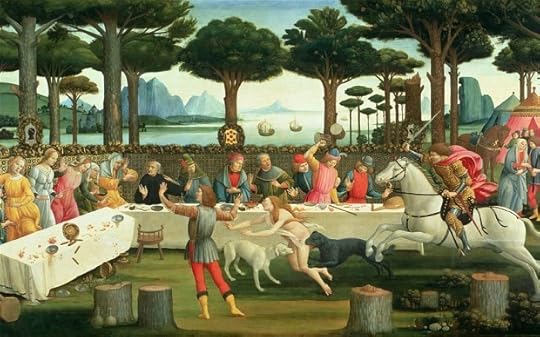
A feast of storytelling: 'The Banquet in the Pinewoods' (1483) by Sandro Botticelli (and workshop), depicting The Story of Nastagio degli Onesti, the eighth tale of the fifth day in The Decameron
The Decameron is one of the great fountainheads of storytelling. Its astonishing narrative fecundity, its dazzling shifts of mood and style, its deliberate counterpoise of artifice and artlessness, its sense that the plainest of ordinary lives conceals the possibility of something fabulous – all these have made it a mother lode of European fiction. Unlike its Oriental forerunners such as The Arabian Nights, this medieval collection of 100 tales offers nothing in the way of magic, fantasy or shape-changing. Marvels and prodigies spring not from the supernatural but arise instead from the chance and coincidence governing even the best-regulated human existence. .....
Introducing his fluent and elegant new translation, Wayne A Rebhorn emphasises Boccaccio’s enduring debt to Dante, the writer on whom he lectured to the Florentines and to whose great work The Decameron pays homage in its structure and moral intent as well as in a scatter of echoes from the poem. Like Dante, Boccaccio begins in mid-catastrophe. The plague has struck at the heart of Florentine society, undermined the rule of law and effectively destroyed the world of privilege, ceremony and respect on which the city’s daily rhythms depend. In streets choked with corpses “there were no tears or candles or mourners to honour the dead; on the contrary, it had reached the point that people who died were treated like goats”.
To read the rest: http://www.telegraph.co.uk/culture/bo...
The Decameron consists of one hundred tales--ten tales told over ten days by ten storytellers, three noblemen and seven ladies. The structure of the work is distinctly medieval by virtue of its allegorical numerology and elaborate architecture, which finds its counterpart in the Gothic cathedral; its scathing and hilarious depictions of a corrupt clergy; and its idealization of women. However, Boccaccio’s attitude towards love--the right true end being pleasurable and guiltless consummation--is much closer to the Renaissance viewpoint.
In addition to the stories is a lengthy introduction in which Boccaccio describes the "brief unpleasantness" necessitating the geographical wanderings and narrative adventures of the ten storytellers, the outbreak of bubonic plague in Florence in 1348.
Commentary The "Author’s Introduction" to The Decameron is both an important historical document of the Black Death in Europe and a significant example of the emergent conventions of plague chronicles and narratives in western culture. For example, Boccaccio proffers the by now familiar conjecture about the source of contagion, a heathen and uncivilized Other (in this case, the infidel East) and the by now common explanation for any medical catastrophe: "God’s righteous anger at our iniquitous way of life."
Most interesting is his protracted description of the display of human behavior during epidemic such as the scapegoating of groups and individuals; the abandonment of family and friends; the personal choices of isolation or dissolution; the cruel indifference to a disproportionately affected underclass. Boccaccio also comments on the deterioration of social institutions such as religion, medicine and public health, law, and customs--all of which prove to no avail in either controlling or comprehending what is happening.
In addition to the stories is a lengthy introduction in which Boccaccio describes the "brief unpleasantness" necessitating the geographical wanderings and narrative adventures of the ten storytellers, the outbreak of bubonic plague in Florence in 1348.
Commentary The "Author’s Introduction" to The Decameron is both an important historical document of the Black Death in Europe and a significant example of the emergent conventions of plague chronicles and narratives in western culture. For example, Boccaccio proffers the by now familiar conjecture about the source of contagion, a heathen and uncivilized Other (in this case, the infidel East) and the by now common explanation for any medical catastrophe: "God’s righteous anger at our iniquitous way of life."
Most interesting is his protracted description of the display of human behavior during epidemic such as the scapegoating of groups and individuals; the abandonment of family and friends; the personal choices of isolation or dissolution; the cruel indifference to a disproportionately affected underclass. Boccaccio also comments on the deterioration of social institutions such as religion, medicine and public health, law, and customs--all of which prove to no avail in either controlling or comprehending what is happening.
In the society that Giovanni Boccaccio’s The Decameron is set in, women generally are held in a lower social standing than men. As with most societies until relatively recently in history, women were not allowed to have a significant role in society, other than that of a wife and mother. In The Decameron, Boccaccio demonstrates that while they may not have significant social standing, women do have an upper hand in most aspects of the male-female relationship. Although the one hundred stories deal with an array of topics, when Boccaccio compares men and women, it appears that he favors women as the better sex in terms of both good and evil. When examining stories where Boccaccio details male-female relationships, it emerges that women are stronger, more lustful, and more cunning. Furthermore, in the instances where the male character appears to triumph or surpass the woman, men usually achieve victory through underhanded means. Overall, it is fair to say that Boccaccio does portray women as outshining men in many respects−some positive, and some negative.
Boccaccio portrays women in The Decameron as being hardier than men. While this trait is not as prevalent throughout the stories, Boccaccio demonstrates that women tolerate more adversity than men do. This increased tolerance for adversity may stem from a basic lack of options: if women are facing some sort of hardship, they have no power to try to eliminate their problems. As a result, women typically endure large amounts of hardship.
(view spoiler)
Boccaccio portrays women in The Decameron as being hardier than men. While this trait is not as prevalent throughout the stories, Boccaccio demonstrates that women tolerate more adversity than men do. This increased tolerance for adversity may stem from a basic lack of options: if women are facing some sort of hardship, they have no power to try to eliminate their problems. As a result, women typically endure large amounts of hardship.
(view spoiler)
 Hello all! I enjoyed the Author's Introduction and the First Story so far. I also appreciated reading the Translator's Introduction, despite it being a bit lengthy, reading the G. H. McWilliam translation. I particularly found interesting the point that the male narrators represent the division of the human soul with Reason personified in Panfilo, Anger in Filostrato and Lust in Dioneo. So too are the seven virtues associated with the female narrators: Pampinea/Prudence, Fiammetta/Temperance, Filomena/Fortitude, Lauretta/Justice, Emilia/Faith, Elissa/Hope and Neifile/Charity. I am also looking forward to seeing the influence of Dante as we read. What a perfect transition.
Hello all! I enjoyed the Author's Introduction and the First Story so far. I also appreciated reading the Translator's Introduction, despite it being a bit lengthy, reading the G. H. McWilliam translation. I particularly found interesting the point that the male narrators represent the division of the human soul with Reason personified in Panfilo, Anger in Filostrato and Lust in Dioneo. So too are the seven virtues associated with the female narrators: Pampinea/Prudence, Fiammetta/Temperance, Filomena/Fortitude, Lauretta/Justice, Emilia/Faith, Elissa/Hope and Neifile/Charity. I am also looking forward to seeing the influence of Dante as we read. What a perfect transition.
 Hey everybody! Just chiming in here, looking forward to tackling this, I was with the Proust group from the start, but couldn't keep up with lots of life stuff happening, good and bad, and I'm the creator of the iCal file for this group way back at the start of the year. I've been poking my way through Dante slower than you all, as it's my 3rd or 4th read through, but I'll be more involved with this, as it's the first time I've ever read it, looking forward to it!
Hey everybody! Just chiming in here, looking forward to tackling this, I was with the Proust group from the start, but couldn't keep up with lots of life stuff happening, good and bad, and I'm the creator of the iCal file for this group way back at the start of the year. I've been poking my way through Dante slower than you all, as it's my 3rd or 4th read through, but I'll be more involved with this, as it's the first time I've ever read it, looking forward to it!
So nice to see you all reading with us!
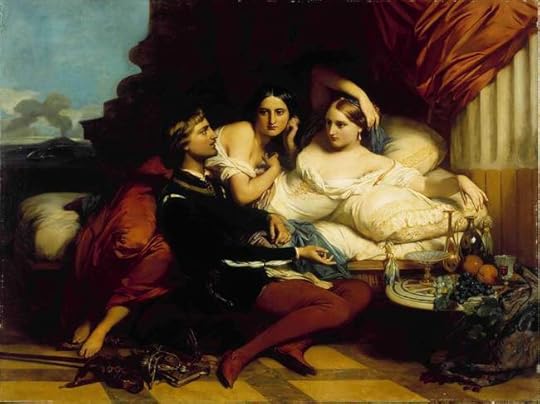
Boccaccio with Queen Jeanne of Naples
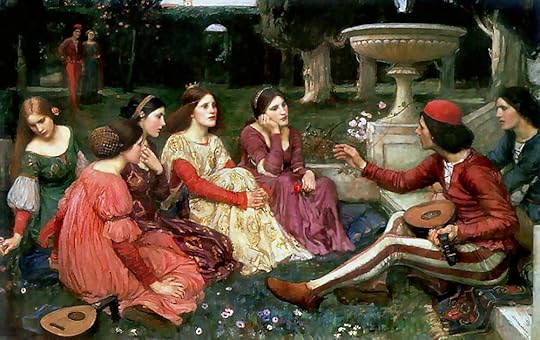
John William Waterhouse, Decameron (1837)

Franz Xavier Winterhalter (1805-1873) The Decameron

Boccaccio with Queen Jeanne of Naples

John William Waterhouse, Decameron (1837)

Franz Xavier Winterhalter (1805-1873) The Decameron
 Emma wrote: "I really liked the first story :) and I looked into if there really is a "Saint Ciappaletto" but I couldn't find anything. Does anyone know anything about that?"
Emma wrote: "I really liked the first story :) and I looked into if there really is a "Saint Ciappaletto" but I couldn't find anything. Does anyone know anything about that?"No there wouldn't be - that would be blasphemous! As it is the story is just a joke on the credulity of Friars (particularly French ones).
 I'm still reading the introduction (lots of interesting information) and haven't made it to the first story yet. Tempted to skip ahead but have forced myself not to do that.
I'm still reading the introduction (lots of interesting information) and haven't made it to the first story yet. Tempted to skip ahead but have forced myself not to do that.Thank you for the beautiful art work.
 Just realised that the second story is set in the past - during Boccaccio's lifetime the Popes were based in Avignon not in Rome.
Just realised that the second story is set in the past - during Boccaccio's lifetime the Popes were based in Avignon not in Rome.
 Hi Renato, Toto, Amelia & Will! Welcome to our little Toscan Palazzo. :)
Hi Renato, Toto, Amelia & Will! Welcome to our little Toscan Palazzo. :)From what I remember when we looked up Fiesole for Dante, the Villa Palmieri is supposed to be the setting for Boccaccio's Decameron:

bigger: http://www.poderesantapia.com/images/...
http://www.casasantapia.com/images/ga...

http://commons.wikimedia.org/wiki/Fil...
http://it.wikipedia.org/wiki/Villa_Pa...
More (view spoiler)
For a google earth sneak peek at the villa: http://www.poderesantapia.com/gardens...
More pics of the villa: http://commons.wikimedia.org/wiki/Cat...
The gorgeous hills of Fiesole: http://dldfoto.altervista.org/fiesole/
 Renato wrote: "How was its reception upon release? Was it controversial?"
Renato wrote: "How was its reception upon release? Was it controversial?"I'm wondering the same thing. I'm just about to start reading the text and I intend to skip the intro (for now) but I have a biography of Boccaccio lined up too... Hopefully there'll be some deets there. :)
 Emma wrote: "I read it like two weeks ago..."
Emma wrote: "I read it like two weeks ago..."Emma, are you reading it Italian like you did la Commedia? I'd be curious to know how Dante & Boccaccio's languages compare... Dante was the first to write in vernacular Italian IIRC and, although he did it in verses, I wonder how the language evolved over the few decades that separate him from Boccaccio... Or maybe it's the prose style that gives it a different feel?
 ReemK10 (Paper Pills) wrote: "Manuscript of the Decameron:"
ReemK10 (Paper Pills) wrote: "Manuscript of the Decameron:"Reem you've been busy! Thank you for all these goodies. I need to catch up with you! :)
 Book Portrait wrote: "Renato wrote: "How was its reception upon release? Was it controversial?"
Book Portrait wrote: "Renato wrote: "How was its reception upon release? Was it controversial?"I'm wondering the same thing. I'm just about to start reading the text and I intend to skip the intro (for now) but I have..."
I finally finished the intro (have to admit to some skimming at the end as the summaries of various stories were leaving me bleary eyed and wanting to actually read the stories themselves. but the earlier parts of the intro had some interesting sections.
Now I will begin the stories tomorrow.
 Sue wrote: "I finally finished the intro (have to admit to some skimming at the end as the summaries of various stories were leaving me bleary eyed and wanting to actually read the stories themselves. but the earlier parts of the intro had some inter..."
Sue wrote: "I finally finished the intro (have to admit to some skimming at the end as the summaries of various stories were leaving me bleary eyed and wanting to actually read the stories themselves. but the earlier parts of the intro had some inter..."You'll like the stories. :) I read the prologue and introduction yesterday, but skipped the editor's preface and the translator's introduction. Maybe I'll come back to them after I've read this week's section. At the moment, I'm searching the internet for illustrations and such important things. :D

Big: http://margheritafontanesi.files.word...
Drawing by Boccaccio (ms 482 BnF, 1365-67)
 The idea is that since Christianity is growing even though its leadership is so corrupt there must be something to it after all. As the man says that proves that it is supported by the Holy Ghost, so he converts.
The idea is that since Christianity is growing even though its leadership is so corrupt there must be something to it after all. As the man says that proves that it is supported by the Holy Ghost, so he converts.
 DL wrote: "I finished the first 5 stories. I don't know why I'm so surprised at their readability. In the first 5 stories the clever man outfoxed the clergy. Except in the second story where a Christian manag..."
DL wrote: "I finished the first 5 stories. I don't know why I'm so surprised at their readability. In the first 5 stories the clever man outfoxed the clergy. Except in the second story where a Christian manag..."I'm planning to read the first five stories tonight. I was surprised too by the readability of the prologue & introduction. The description of the plague in Florence made me believe that Boccaccio had witnessed all this but a note pointedly asserts the contrary...
 Jan-Maat wrote: "The idea is that since Christianity is growing even though its leadership is so corrupt there must be something to it after all. As the man says that proves that it is supported by the Holy Ghost,..."
Jan-Maat wrote: "The idea is that since Christianity is growing even though its leadership is so corrupt there must be something to it after all. As the man says that proves that it is supported by the Holy Ghost,..."I just loved that story! I wonder if there is something similar in Chaucer ?
 Yann wrote: "I just loved that story! I wonder if there is something similar in Chaucer ? "
Yann wrote: "I just loved that story! I wonder if there is something similar in Chaucer ? "Apparently not according to this website:
http://sites.fas.harvard.edu/~chaucer...
Book Portrait wrote: "The description of the plague in Florence made me believe that Boccaccio had witnessed all this but a note pointedly asserts the contrary..."
He would have certainly witnessed the plague somewhere though. What he says of Florence would have been true of other places too: the fear, the breakdown of customs, the hasty burials...
 Jan-Maat wrote: "He would have certainly witnessed the plague somewhere though. What he says of Florence would have been true of other places too: the fear, the breakdown of customs, the hasty burials..."
Jan-Maat wrote: "He would have certainly witnessed the plague somewhere though. What he says of Florence would have been true of other places too: the fear, the breakdown of customs, the hasty burials..."Thanks. I checked and both Brown and another site confirm that Boccaccio was in Florence during the Plague:
Brown: (view spoiler) http://www.brown.edu/Departments/Ital...
Pathways: (view spoiler) http://www.internetculturale.it/openc...
Whereas McWilliams' notes say:
"Boccacio's famous description of the ruinous effects of the plague in Florence in 1348, graphic and convincing though it may appear, is not to be read as the eyewitness account he claims it to be. It is in fact based upon earlier plague descriptions, in particular the one found in the eigth-century Historia Langobardorum by Paulus Diaconus ('Paul the Deacon')."
It makes one reads the Penguin's notes with a more critical eye...
 Yann wrote: "I just loved that story! I wonder if there is something similar in Chaucer ? "
Yann wrote: "I just loved that story! I wonder if there is something similar in Chaucer ? "You know this second story is so concise and striking with its little twisty logic, it makes me wonder where Boccaccio found the inspiration for this type of humorous/paradoxical thinking. I'm not sure why but I'd spontaneously associate it more with the Jewish or Greek culture than the Christian one (not that I'm an expert in any of these!)...
In the Introduction I enjoyed reading about the women who would go to the house of the defunct... Recently I attended a lecture that talked about what in Spanish are called "plañideras", or the "plaintives" in Art...
A sample from 13th century.
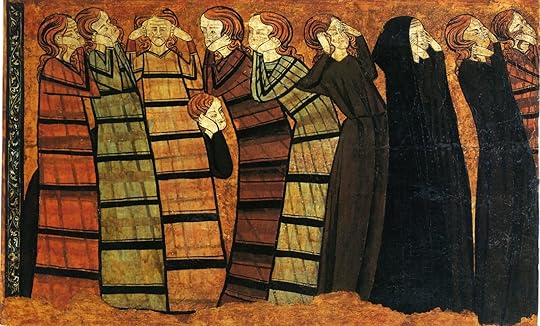
And Egyptian:
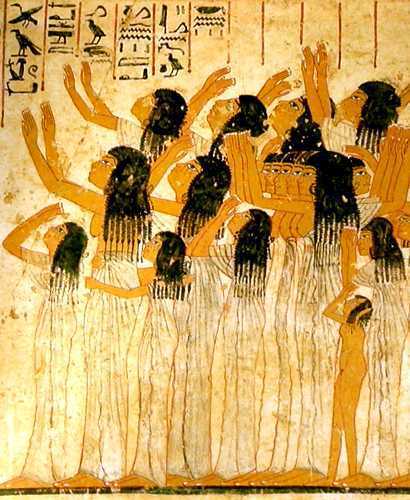
A sample from 13th century.

And Egyptian:

 Kalliope wrote: "In the first tale, the pope Boniface must be Boniface VIII, the pope that Dante hated so much."
Kalliope wrote: "In the first tale, the pope Boniface must be Boniface VIII, the pope that Dante hated so much."Interesting! Here is Boniface VIII arrested by Guillaume de Nogaret, send by Philippe le Bel, king of France (8 september 1303):

Yann wrote: "Kalliope wrote: "In the first tale, the pope Boniface must be Boniface VIII, the pope that Dante hated so much."
Interesting! Here is Boniface VIII arrested by Guillaume de Nogaret, send by Philip..."
Dante would love to see that illustration... I also like it but for different reasons...
Interesting! Here is Boniface VIII arrested by Guillaume de Nogaret, send by Philip..."
Dante would love to see that illustration... I also like it but for different reasons...
 Kalliope wrote: "Yann wrote: "Kalliope wrote: "In the first tale, the pope Boniface must be Boniface VIII, the pope that Dante hated so much."
Kalliope wrote: "Yann wrote: "Kalliope wrote: "In the first tale, the pope Boniface must be Boniface VIII, the pope that Dante hated so much."Interesting! Here is Boniface VIII arrested by Guillaume de Nogaret, s..."
You are right: Dante talked about that in Purgatorio, Canto XX, 85-90. I forgotted! >.<
http://es.wikipedia.org/wiki/Atentado...
 I really like actually reading Boccacio's own words in his description of the Plague and the introduction of his characters. In the future I would forgo the translator's intro.
I really like actually reading Boccacio's own words in his description of the Plague and the introduction of his characters. In the future I would forgo the translator's intro.
 DL wrote: "I started the intro then decided it was giving away too much of the story. I wanted to discover them on my own. Glad I skipped it."
DL wrote: "I started the intro then decided it was giving away too much of the story. I wanted to discover them on my own. Glad I skipped it."You made a wise decision! He really pulls it apart too much. That's when I really skimmed completely. I am enjoying the translation very much.
 Toto wrote: "... delightful little ditties, ... with a clear nod to various traditions of story telling....showcase are the pleasures of outwitting one another..."
Toto wrote: "... delightful little ditties, ... with a clear nod to various traditions of story telling....showcase are the pleasures of outwitting one another..."I get the same vibe from these stories. They're entertaining in the best possible way. I'm loving the wit and the light-but-serious tone.
 Sue wrote: "DL wrote: "I started the intro then decided it was giving away too much of the story. I wanted to discover them on my own. Glad I skipped it."
Sue wrote: "DL wrote: "I started the intro then decided it was giving away too much of the story. I wanted to discover them on my own. Glad I skipped it."You made a wise decision! He really pulls it apart ..."
Glad I skipped it too! I'll come back to it when we're finished. Like DL I just want to discover the stories on my own first.
 Kalliope & Yann's comments as well as Jan-Maat's remark on the story being set in the past correspond to what I read in Boccace: Conteur et passeur de la Renaissance (which I've barely started but seems really good). This passage in particular, which talks about the influence of his father's stories from when he worked as a merchant-banker in Paris at the beginning of the XIVth century:
Kalliope & Yann's comments as well as Jan-Maat's remark on the story being set in the past correspond to what I read in Boccace: Conteur et passeur de la Renaissance (which I've barely started but seems really good). This passage in particular, which talks about the influence of his father's stories from when he worked as a merchant-banker in Paris at the beginning of the XIVth century:Cette prospérité faisait du père de Boccace un riche marchand et lui donnait une autorité certaine dans le milieu des "lombards". Pour son jeune fils vivant à Florence, il fut une source inépuisable de récits ayant le monde du commerce comme scène grandiose et comme héros des marchands, grands, moyens ou petits, nobles ou bourgeois. On a pu évoquer le Décameron à juste titre comme "l'épopée des marchands"* et, à l'instar de toute épopée, celle-ci ne se situe pas dans le présent du conteur, mais dans le passé, lequel est le présent de son père au début du XIVe siècle, lorsque le commerce florentin s'étendait de l'Orient à l'Occident et que Paris en était le carrefour.
* Vittore Branca, who seems to be a foremost scholard was the one who called it "l'epopea dei mercatanti"
 Illustrations - Prologue & Introduction
Illustrations - Prologue & Introduction
Big: http://visualiseur.bnf.fr/ConsulterEl...
BnF ms italien 63 - Boccacio writing
More (view spoiler)
Book Portrait wrote: "Kalliope & Yann's comments as well as Jan-Maat's remark on the story being set in the past correspond to what I read in Boccace: Conteur et passeur de la Renaissance (which I've bar..."
Thank you, I am eyeing the Marietti book... I am currently reading Boccaccio: A Critical Guide to the Complete Works
Thank you, I am eyeing the Marietti book... I am currently reading Boccaccio: A Critical Guide to the Complete Works
 Illustrations - Day I Story 1
Illustrations - Day I Story 1
http://visualiseur.bnf.fr/ConsulterEl...
ms63 - Prayers to Cepperello
More (view spoiler)
 Kalliope wrote: "Thank you, I am eyeing the Marietti book... I am currently reading Boccaccio: A Critical Guide to the Complete Works "
Kalliope wrote: "Thank you, I am eyeing the Marietti book... I am currently reading Boccaccio: A Critical Guide to the Complete Works "I've really only started Marietti's book... How are you liking the critical guide? Is it similar to the Raffa one on Dante?
Book Portrait wrote: "Kalliope wrote: "Thank you, I am eyeing the Marietti book... I am currently reading Boccaccio: A Critical Guide to the Complete Works "
I've really only started Marietti's book... How are you liki..."
No, more like essays... Too early to tell.. just two chapters in but one I stopped because it had spoilers...
I've really only started Marietti's book... How are you liki..."
No, more like essays... Too early to tell.. just two chapters in but one I stopped because it had spoilers...
 Illustrations - Day I story 2
Illustrations - Day I story 2
http://visualiseur.bnf.fr/ConsulterEl...
ms 63 - Abraham/John's baptism
More (view spoiler)
Books mentioned in this topic
A Tale of a Tub (other topics)Boccace: Conteur et passeur de la Renaissance (other topics)
Boccaccio: A Critical Guide to the Complete Works (other topics)
Boccace: Conteur et passeur de la Renaissance (other topics)
The Merchant of Prato: Daily Life in a Medieval Italian City (other topics)
More...




